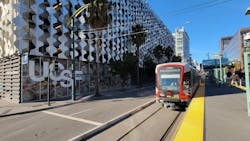Clipper BayPass phase two pilot shows success with single pass option
Initial results from the Clipper BayPass phase two pilot program that took place over the last year revealed that riders who participated with the first three partner organizations in aggregate took over a third more transit trips in the ladder half of 2024 compared to the same timeframe in 2023. These gains in ridership generated additional fare revenue to the tune of approximately $1.1 million for Bay Area transit agencies for fiscal year 2025.
Bay Area transit agencies and Metropolitan Transportation Commission (MTC) launched the Clipper BayPass pilot program in 2022 to identify how a single pass that could provide unlimited access to all bus, rail and ferry services in the nine-county region would impact ridership. The pilot was created to study what effect the pass might have on:
- Increasing transit ridership.
- Generating new transit revenues.
- Improving customer experience and attitudes toward transit.
Phase two of the Clipper BayPass pilot, launched in 2024, sold all-access transit passes to organizations for their employees, students and/or residents. Original phase two participants included 10,300 people affiliated with the University of California at San Francisco (UCSF), the Alameda Transportation Management Association (TMA) and the city of Menlo Park. Increasing through the following year, there were a total of 15 paying BayPass partner organizations as of September 2025, with approximately 84,000 individuals eligible for BayPass.
A share of surveyed BayPass users at UCSF, the Alameda TMA and Menlo Park indicated that public transit is a “very appealing” option for traversing the Bay Area, a statistic that increased fivefold since they received BayPass. Most respondents indicated they use transit more often for trips to work, school, healthcare and recreation.
These phase two results further findings from the first phase where BayPasses were distributed to 51,300 people at San Francisco State University, San José State University, Santa Rosa Junior College and the University of California at Berkeley, as well as to residents at 12 affordable housing properties in the Bay Area.
The evaluation report for the first phase of the BayPass pilot program released in June and showed that students with access to Clipper BayPass took nearly a third more transit trips than their peers with access only to preexisting programs, and made more than twice as many transfers between transit agencies during the studied period of August 2022 through June 2024.
The Clipper BayPass pilot program suggests that BayPass improves student and employee retention rates, something observed in both phases. The program evaluation of the first phase uncovered that students randomly assigned BayPass were 6% to 15% less likely to leave their university between fall 2022 and fall 2023 than their peers without similar access. Further, a share of phase two survey respondents indicating they were more likely to stay at their current job due to the pass increased by 44%.
